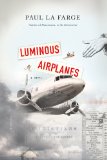Summary | Excerpt | Reviews | Beyond the Book | Readalikes | Genres & Themes | Author Bio

A Novel
by Paul LaFarge
I went back to the laundromat and retrieved my clothes from the dryer. I carried the clean clothes back to my apartment, but now my apartment itself looked wrong. The living room contained only a coffee table and an ancient red futon; the dining room had an even older sofa, a TV set, and a white imitation bearskin rug that my ex-housemate Victor had inherited from an uncle in Moscow. When Alice and I were going out, she nagged me to redecorate, but I said I liked my old things. "Your things aren't old," she said, "they're just ugly." She was right, but I refused to see it. Whenever she pointed out a chair or table or sofa in the window of a store downtown and said, "Why don't you get one of those?" I objected that it wouldn't go with the furniture I already had, even though nothing would have gone with my furniture. It was a question of living with it or replacing everything. That afternoon I considered replacing everything; there was a store on Seventeenth and Valencia that catered to people like me, bohemian types who had a little money, and if I had gone there, everything might have turned out differently. The desperation of my heart, the feeling of loss that I still couldn't connect to my grandfather's death, all that emotion might have resolved itself in a sofa and loveseat, a leather armchair, a media center made from salvaged pine flooring. I might be in San Francisco now, living with Alice in my redecorated apartment; we might be happy together. But in fact I didn't have the energy or the will to buy furniture, and here I am in New York, living with a stranger.
I went out for a super vegetarian burrito, came home, opened a beer and took it into my study, which was cluttered with books and papers from the days when I had been a graduate student in history at Stanford, the pre-Cetacean era. Now I didn't use the study for anything; on the whole it depressed me. I rummaged through the drawers of my fireproof filing cabinet for Swan's leaflets, hoping that his talk of laser wolves and spirit flight and the Coming of the Great Ghosts would somehow cheer me up, but what I found were the notes for my dissertation. They were the opposite of what I wanted, but I was in that totally exhausted state where you don't think clearly and your goals and objectives shift around like shadows, leading you from one bad idea to the next. Soon I was leafing through xeroxed microfilms of nineteenth-century newspapers, myannotations squiggling past in the margins like flipbook animations. Was there any use for this stuff, I wondered, or was it just lost time, and not even lost time in the Proustian sense, time that comes surging back to you out of a cup of cooling tea, but time truly squandered, irrecoverable, lost to a kind of academic coma? My head hurt just thinking about it. I left the papers heaped on the desk and went to bed, and the last thing I noticed before I fell asleep was that Robert was playing "Positively 4th Street" upstairs at top volume, and that I didn't care.
THE GREAT DISAPPOINTMENT
My dissertation was, or would have been, about the "doom-minded Millerites," a group of radical Protestants who believed the world would end in 1843. They were named for William Miller, a New York State farmer who had added up the years of the prophecies in the books of Daniel and Revelation, according to a complex and not obviously correct system of his own, and fixed 1843 as the deadline for the apocalypse. Tens of thousands of people were convinced by his calculations, and as the final year approached they prayed and read and danced themselves into a frenzy of anticipated salvation. But the world did not end. Late in the year one of Miller's disciples added up the numbers again, and concluded that the world would end on October 22, 1844. On that day, somewhere between fifty thousand and half a million Millerites gathered in churches, on hilltops and in cemeteries. They sang; they prayed; they waited. Nothing happened. Eventually they returned home to sleep.
Copyright © 2011 by Paul La Farge
I have lost all sense of home, having moved about so much. It means to me now only that place where the books are ...
Click Here to find out who said this, as well as discovering other famous literary quotes!
Your guide toexceptional books
BookBrowse seeks out and recommends the best in contemporary fiction and nonfiction—books that not only engage and entertain but also deepen our understanding of ourselves and the world around us.